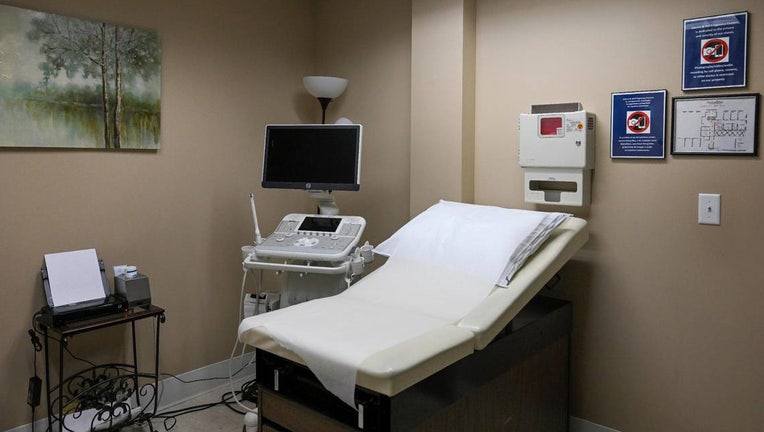Florida Supreme Court keeps 15-week abortion limit in place

(Tammy Ljungblad/The Kansas City Star/Tribune News Service via Getty Images)
TALLAHASSEE, Fla. - The Florida Supreme Court on Monday rejected requests to halt a law that prevents abortions after 15 weeks of pregnancy.
Justices, in a 4-1 decision, turned down a motion by seven abortion clinics and a doctor for a stay of a ruling by the 1st District Court of Appeal that kept the law in place. The one-paragraph decision did not detail the Supreme Court’s reasoning.
At a minimum, the decision will keep the law in effect until the Supreme Court can rule on underlying issues in the case. Justices Charles Canady, Ricky Polston, John Couriel and Jamie Grosshans were in the majority, while Justice Jorge Labarga wrote a short dissent.
"In view of this (Supreme) Court’s longstanding precedent, I conclude that the petitioners have met the exacting burden required for this Court to stay the First District Court of Appeal’s decision pending review in this Court," Labarga wrote.
Chief Justice Carlos Muniz and Justice Renatha Francis did not take part.
The majority’s decision did not directly address a major question in the case: whether the Supreme Court will reverse decades of legal precedent that has said a privacy clause in the state Constitution protects abortion rights.
The decision and a similar 4-1 ruling Monday on another issue involving a stay came about five months after the 1st District Court of Appeal tossed out a temporary injunction issued by Leon County Circuit Judge John Cooper, who said the 15-week limit violated the privacy clause in the Constitution.
The appeals court ruled the plaintiffs could not show "irreparable harm" from the 15-week limit, which lawmakers and Gov. Ron DeSantis approved last year amid a national debate about abortion rights.
The plaintiffs quickly took the case to the Supreme Court and asked for a stay of the appeals-court ruling to prevent the law from being in effect while the legal battle continued. Earlier, the plaintiffs had asked the Supreme Court to vacate an automatic stay that had been imposed on Cooper’s ruling after it went to the appeals court. The other 4-1 decision Monday rejected that request.
The clinics and physician Shelly Hsiao-Ying Tien filed the lawsuit June 1, and Cooper issued the temporary injunction July 5. The state immediately appealed, which, under legal rules, placed the automatic stay on Cooper’s ruling — keeping the 15-week limit in effect.
The appeals court refused to lift the automatic stay and subsequently rejected Cooper’s temporary injunction.
In their Aug. 31 motion for a stay filed at the Supreme Court, the plaintiffs contended that the 1st District Court of Appeal had not followed precedents.
"Granting plaintiffs’ requests to stay the First DCA’s decision and allow the injunction to take effect would restore the status quo while litigation continues and allow Floridians to resume exercise of their constitutional right to decide whether to carry a pregnancy to term or obtain a pre-viability abortion — a right that this (Supreme) Court has repeatedly recognized is encompassed by the Florida Constitution’s right of privacy," said the brief, filed by attorneys for the American Civil Liberties Union, Planned Parenthood, the Center for Reproductive Rights and the national law firm of Jenner & Block.
But in September, Attorney General Ashley Moody’s office urged the Supreme Court to reject the motion for a stay — and to go further by finding that the privacy clause does not apply to abortion rights.
"Florida’s Privacy Clause creates a right ‘to be let alone and free from governmental intrusion into the person’s private life,’" lawyers in Moody’s office wrote in one filing. "That language is naturally read to limit governmental snooping and information-gathering — but not to establish a liberty to destroy unborn (or any other) life."
If the Supreme Court ultimately goes along with Moody’s arguments, it could clear the way for DeSantis and the Republican-controlled Legislature to place more restrictions on abortions. The court has become dominated by conservative justices since DeSantis took office in 2019, at least in part because of the retirements of three longtime justices, Barbara Pariente, R. Fred Lewis and Peggy Quince, who helped make up a more-liberal majority.
Monday’s decisions came a day after Vice President Kamala Harris made an appearance in Tallahassee to support abortion rights on the 50th anniversary of the U.S. Supreme Court’s Roe v. Wade decision. The U.S. Supreme Court overturned Roe v. Wade last year, leaving abortion decisions up to states.

